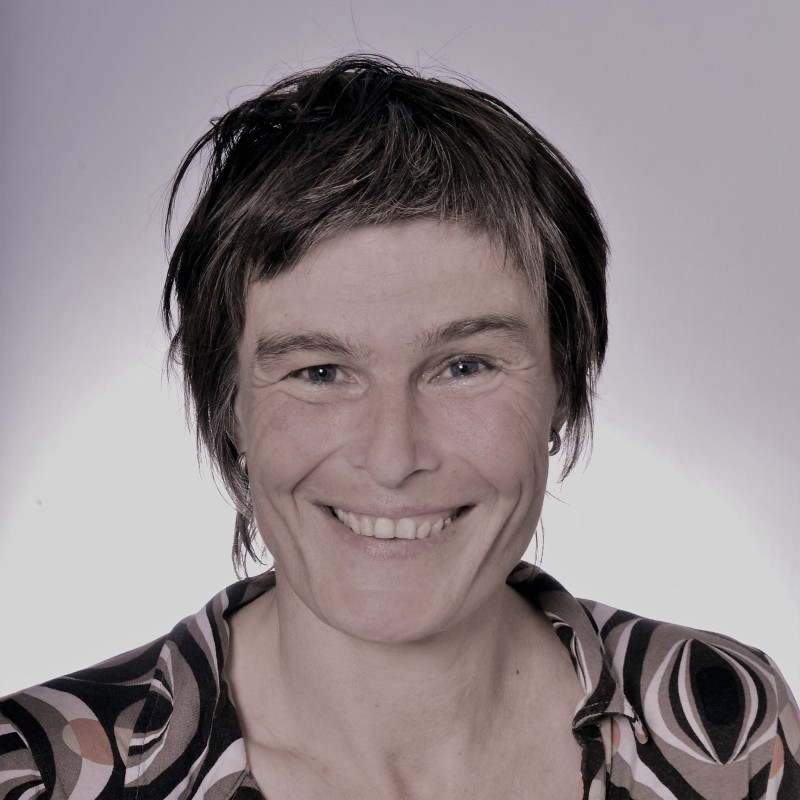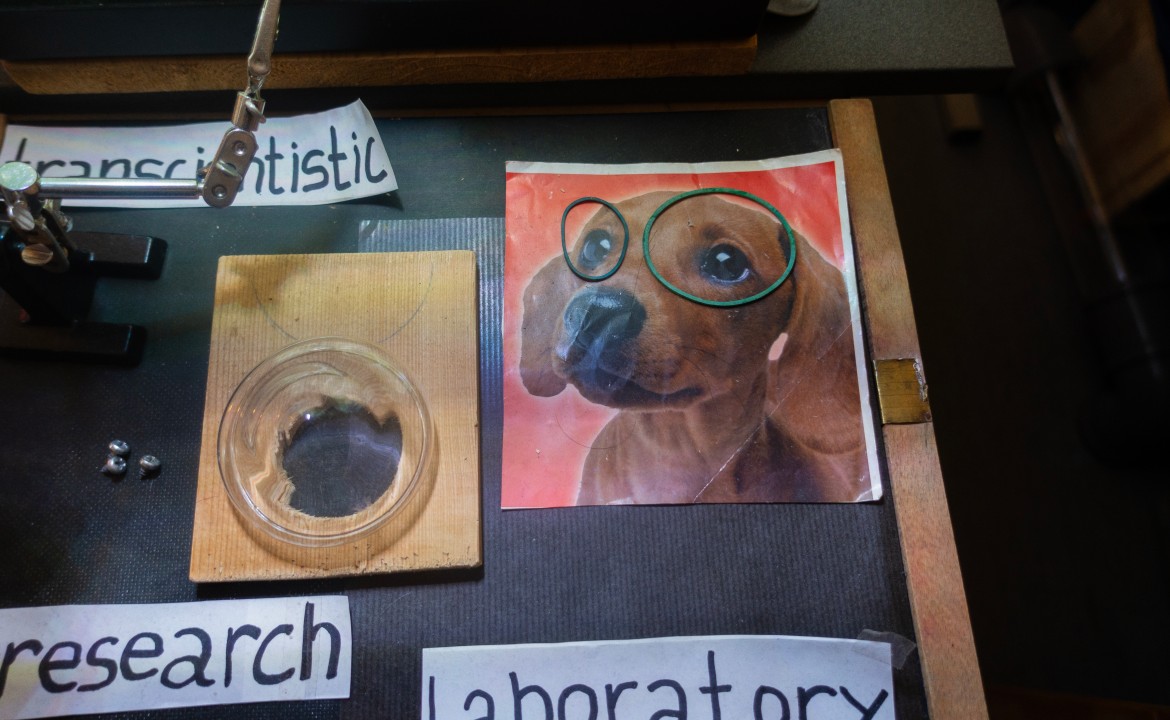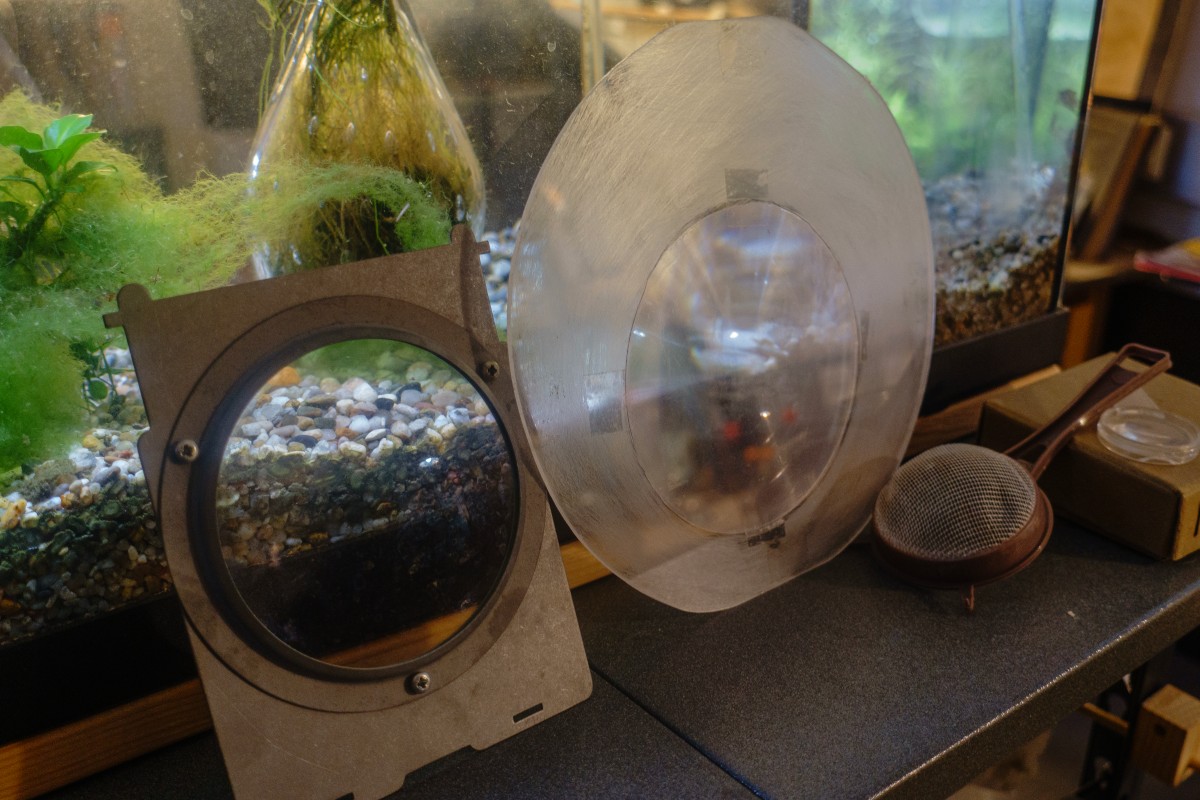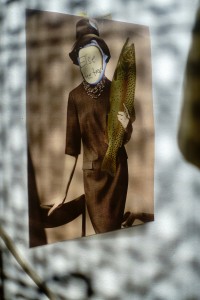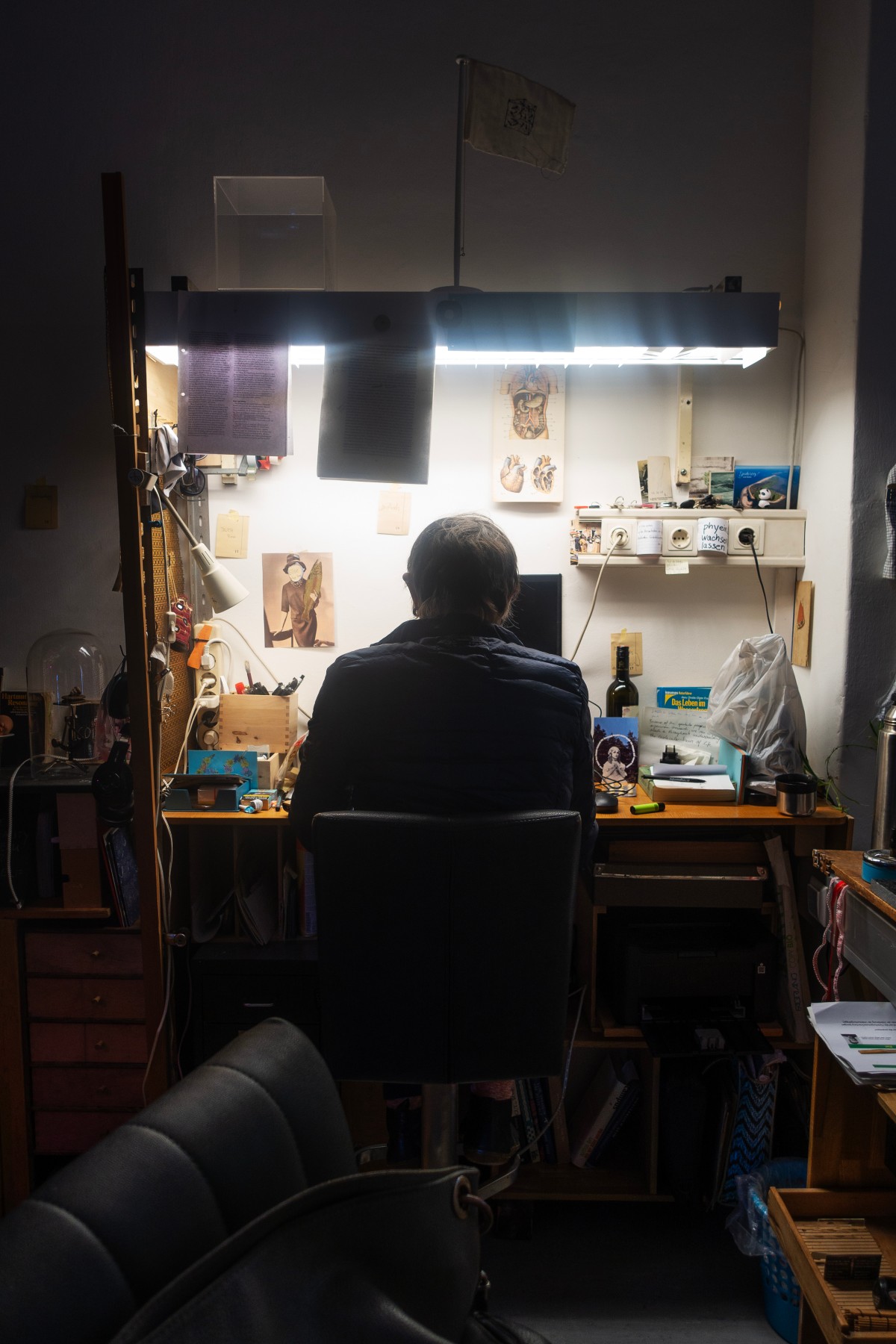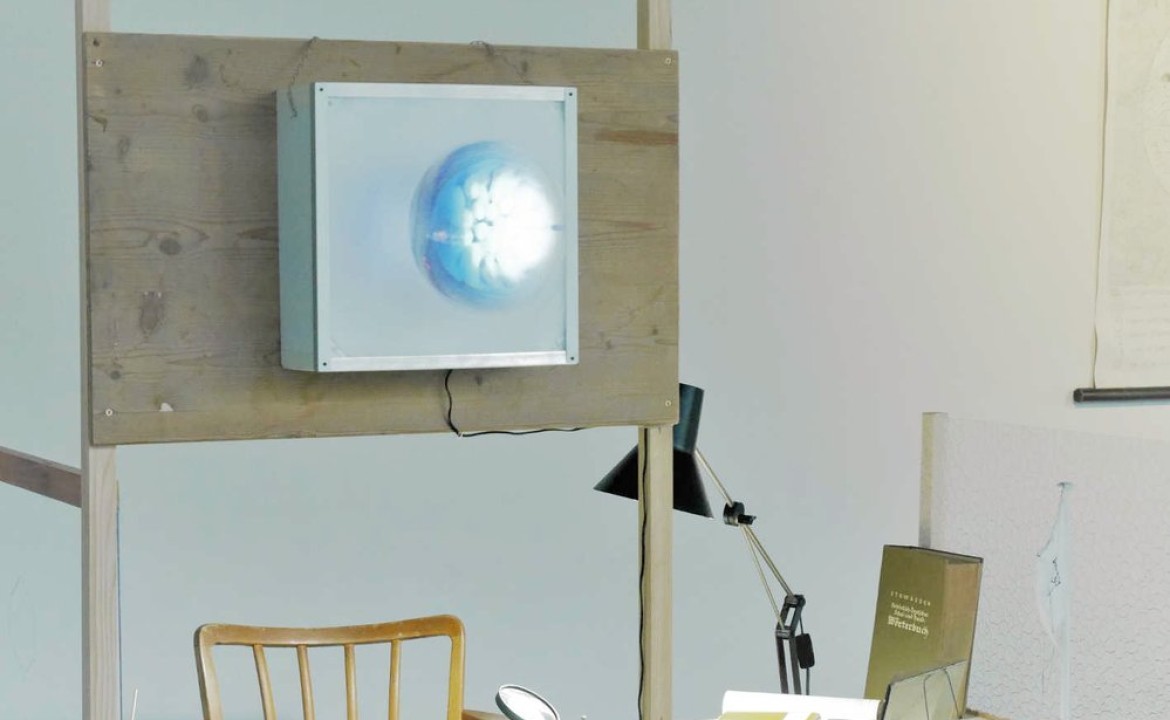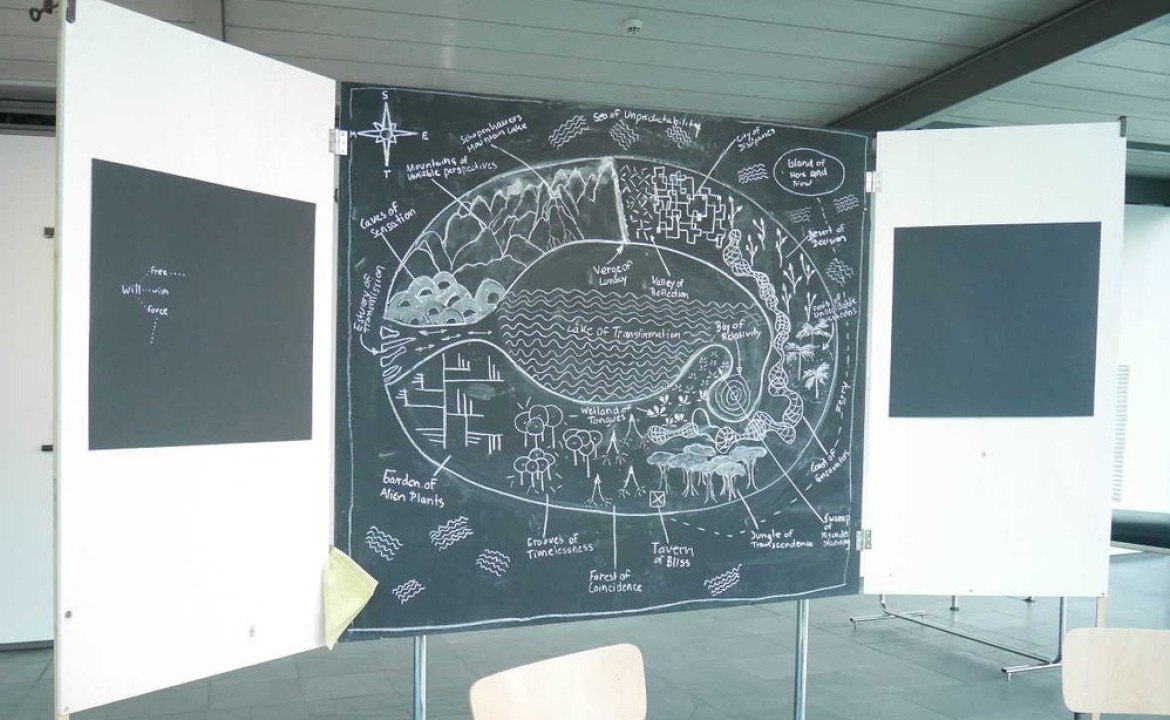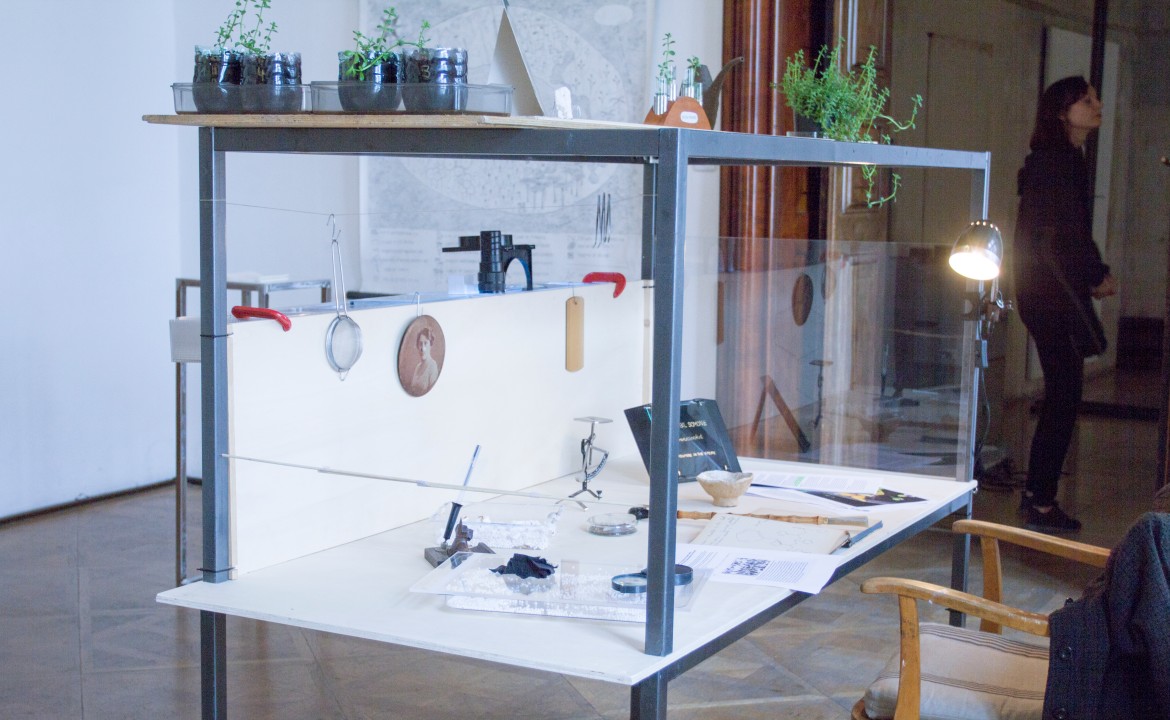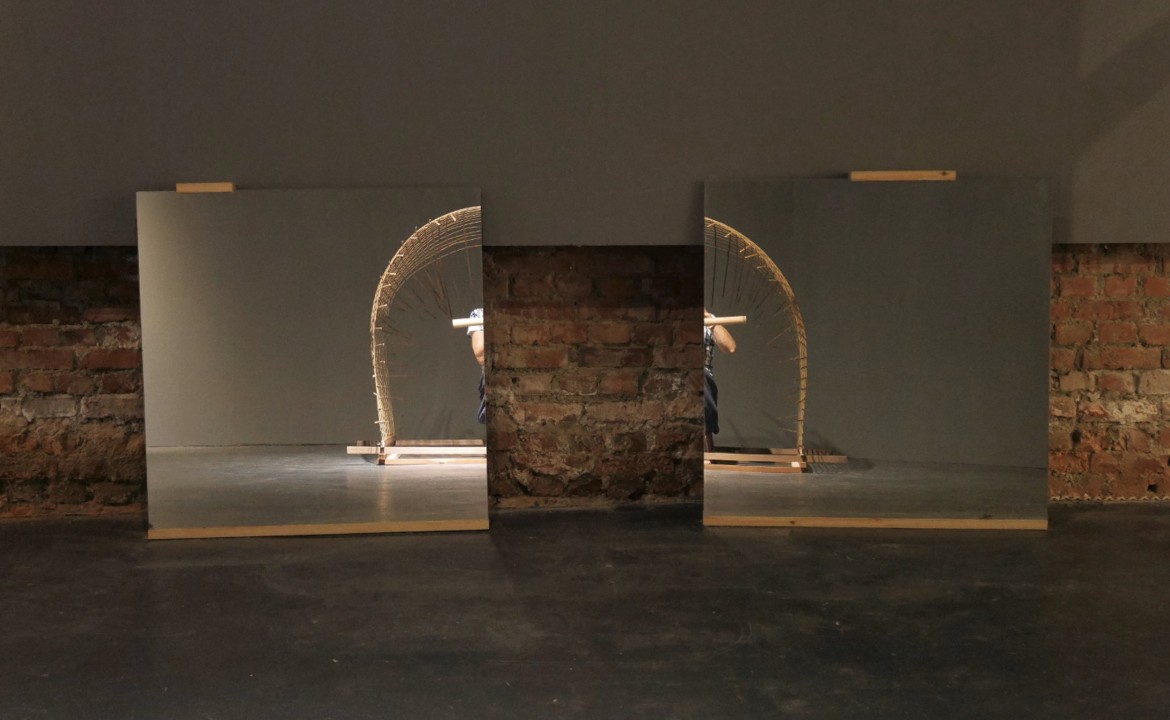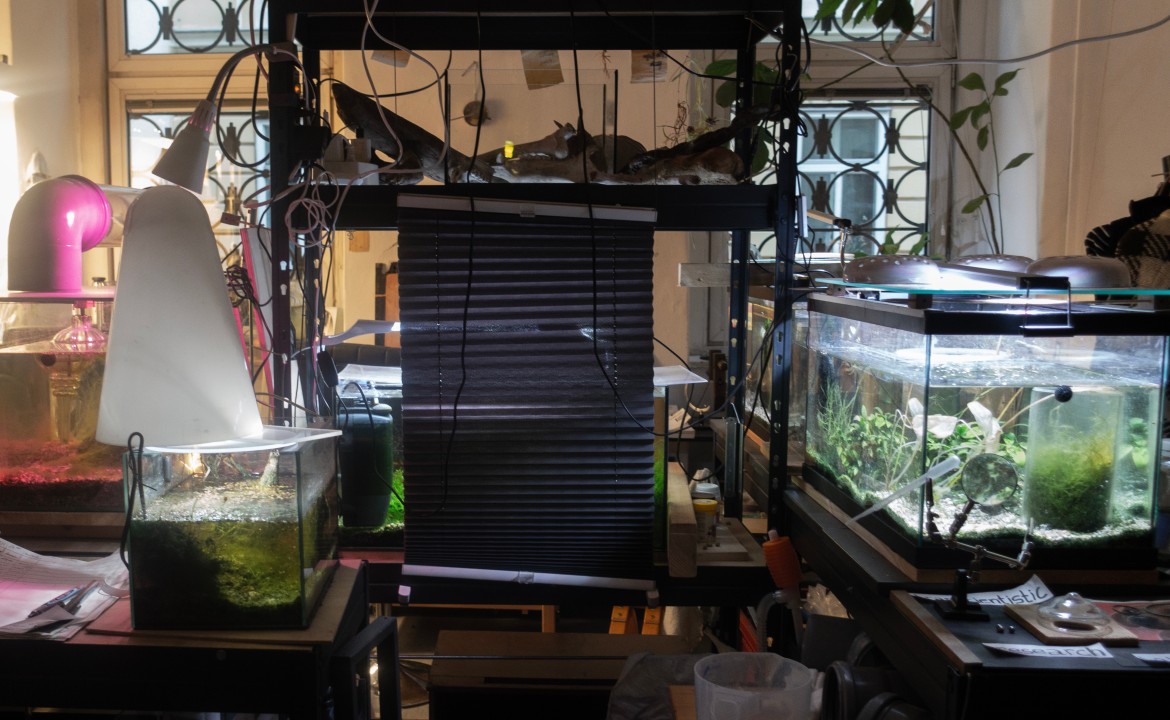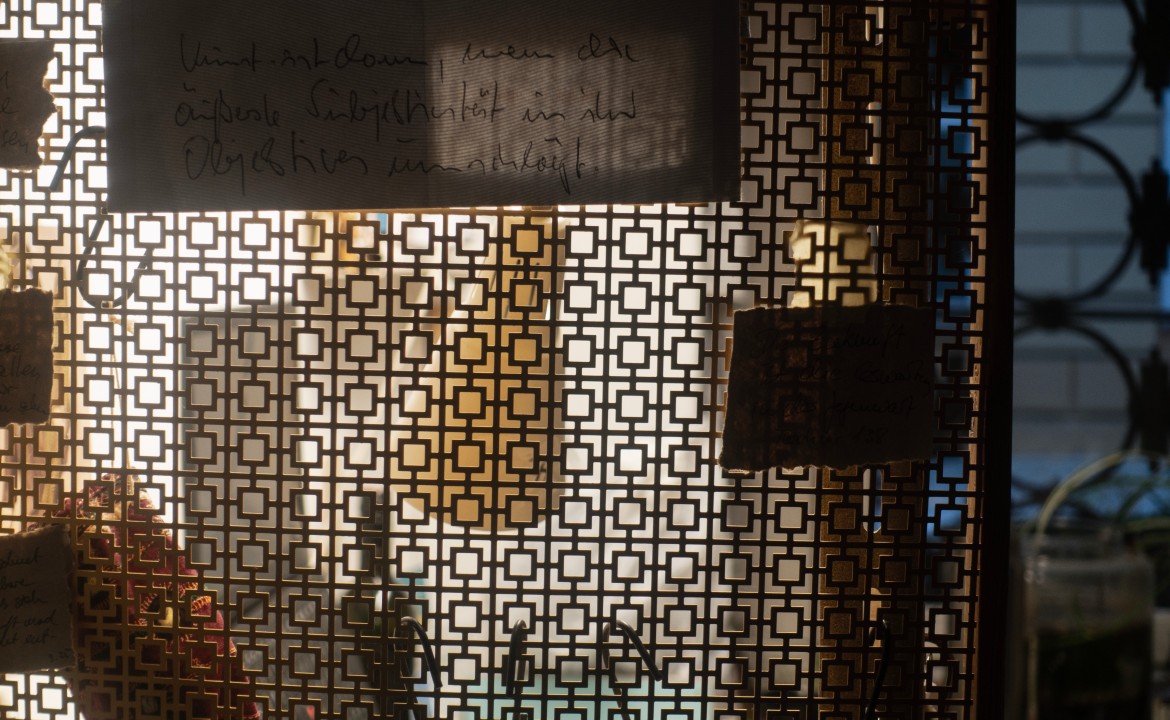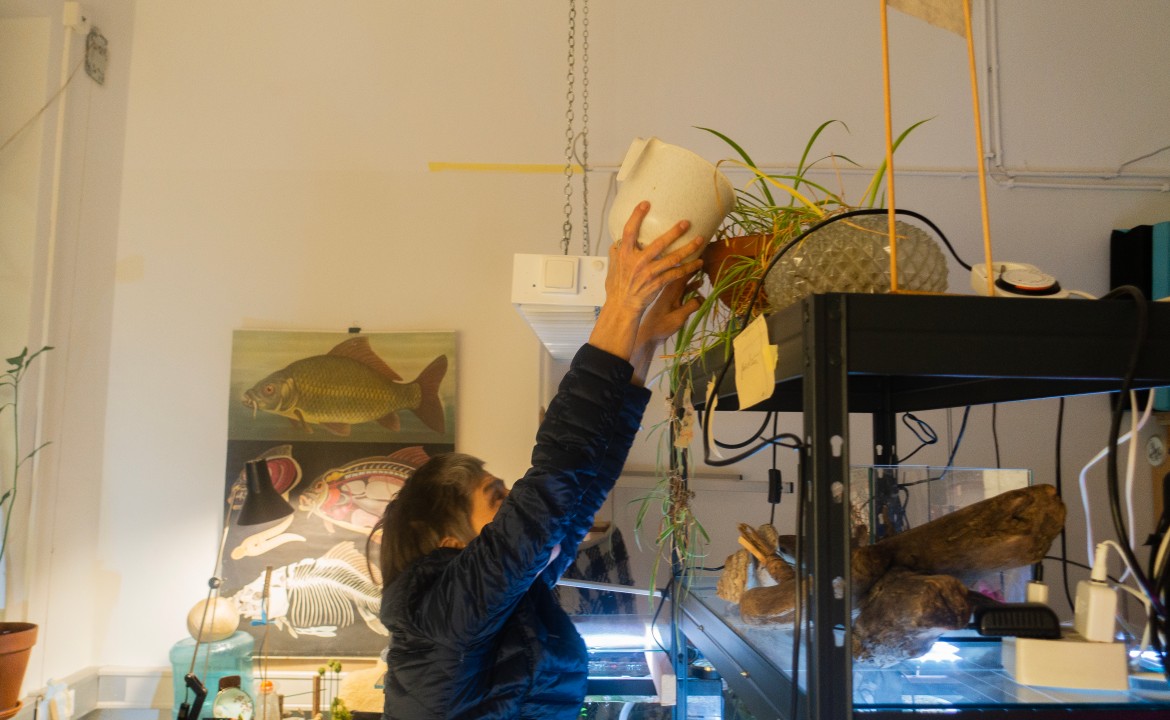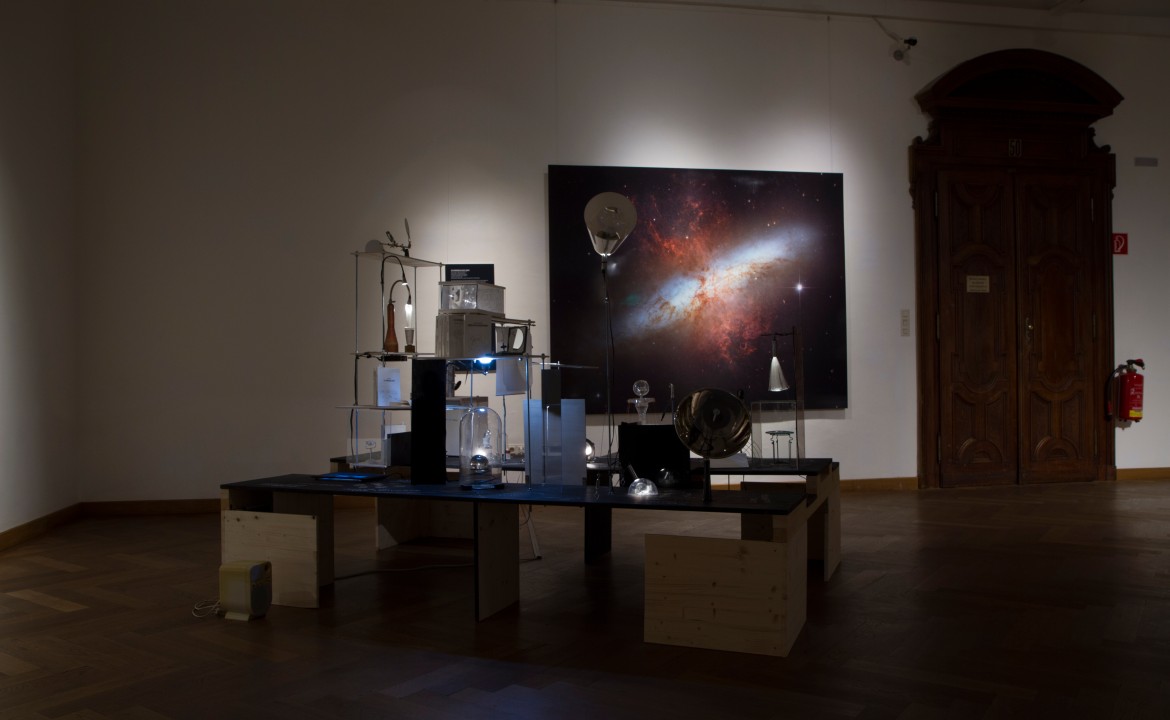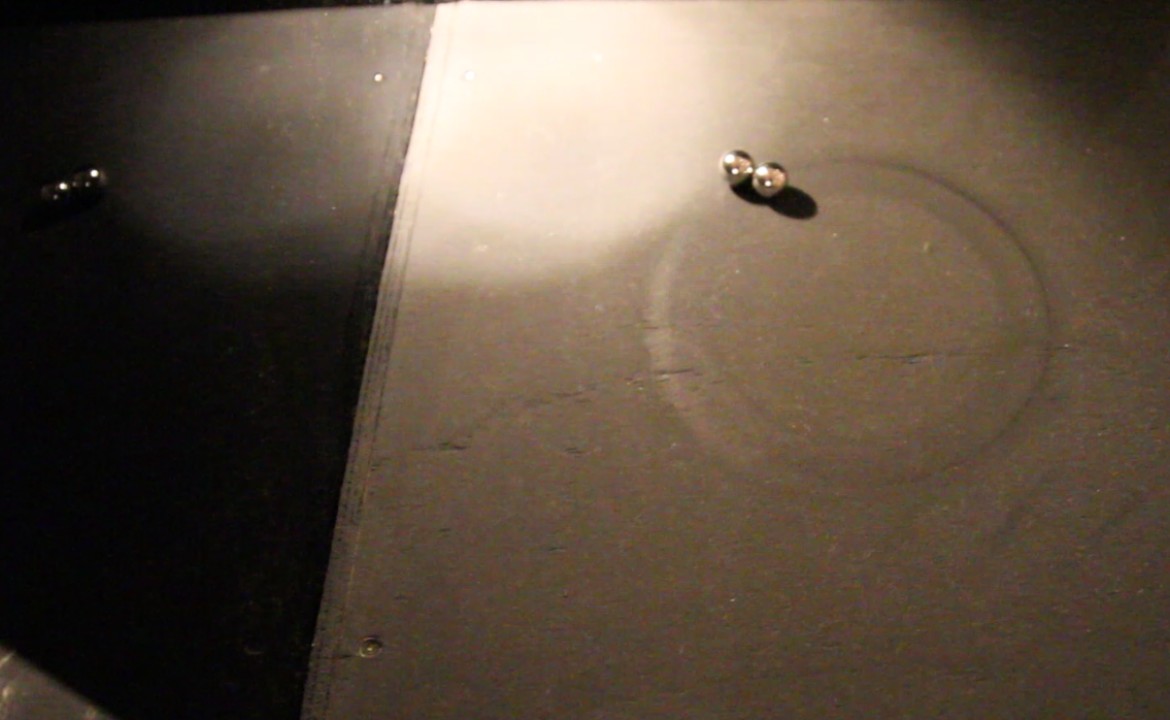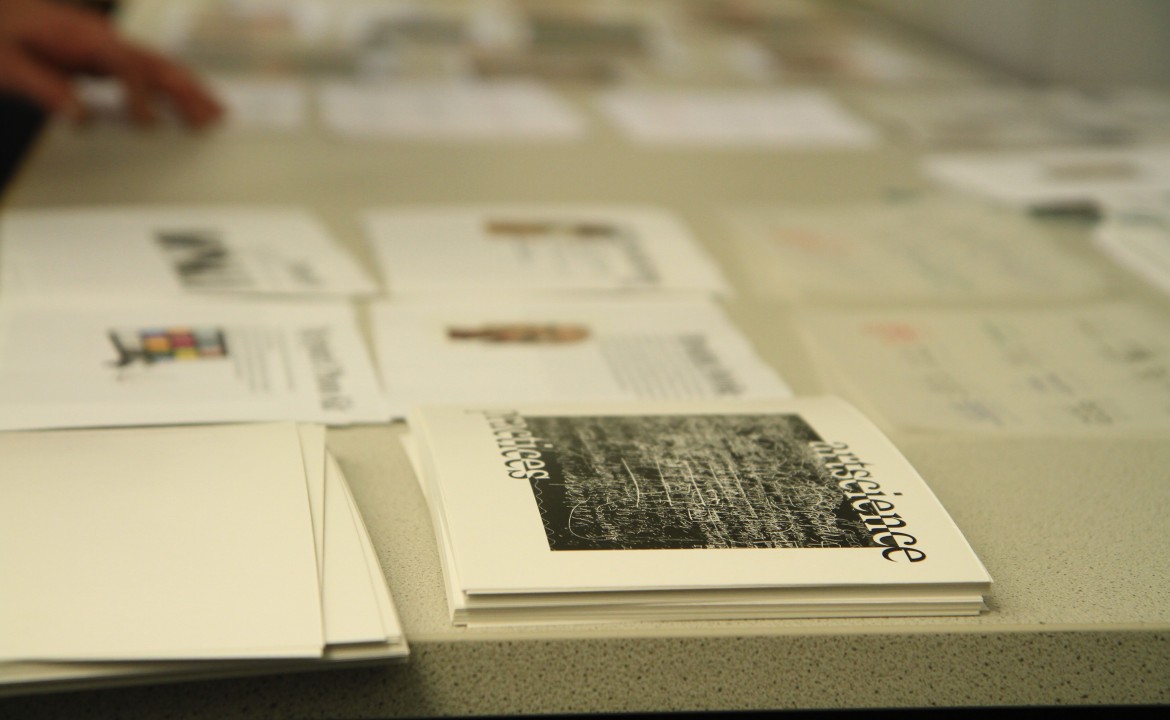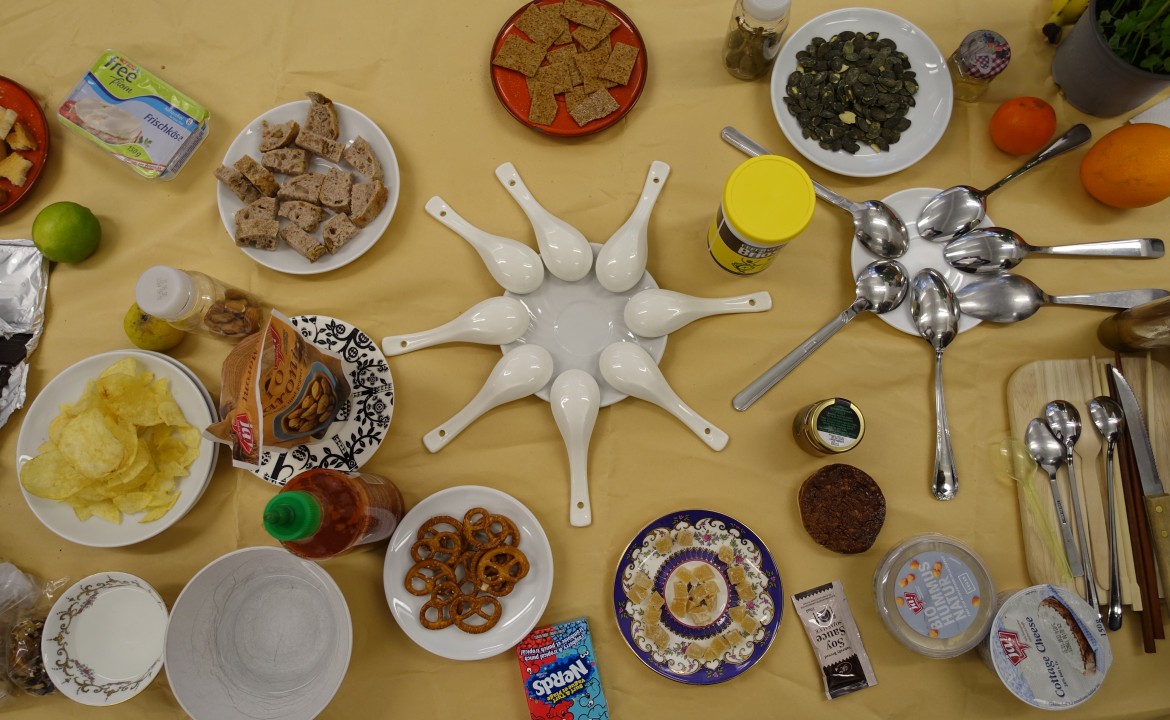Welcome to the studio of Margit Busch. 2024
Margit, you were amongst the first students I have met, back then at Hohenstaufengasse. Have you ever thought that your connection to Art and Science in general – and in particular with Angewandte's study program – would last for so many years?
No. [laughs...]
Your passion for art started after your studies in biology. Can you tell us what brought you there and why you didn’t continue with your scientific career?
Research questions in science are usually quite narrowly defined. However, many phenomena and problems seem to me to be the
result of complex interactions, which is why I believe that methods and perspectives are needed to do justice to this complexity.
In addition, artistic research deals with epistemological questions that are often ignored in academic routine.
Photos: Margit and objects at Studio Rössl, Rienößlgasse, Vienna
Your Master Thesis is about...
the invention of a discipline that operates through and within a multitude of disciplines and is located somewhere in the
future. The work consisted in a laboratory setting in which mealworms and the adult mealworm beetles living in a polystyrene
environment were investigated and listened to. You might have to know that mealworms and mealworm beetles are able to digest
polystyrene and use it as a food source.
Master Thesis: IF-THEN-ELSE. Welcome to transciency. Work and Photos (c) Margit Busch. 2016.
"To science I relate methods, methodologies, mechanisms,
protocols, proofs, theories, experiments and a research question.
Art is to me a field of free research, a field of applied philosophy, a way to communicate,
a way to think and act. Art allows transcending disciplines and utilising different
knowledge cultures including science."
protocols, proofs, theories, experiments and a research question.
Art is to me a field of free research, a field of applied philosophy, a way to communicate,
a way to think and act. Art allows transcending disciplines and utilising different
knowledge cultures including science."
Experiences you have made after graduation
After my Master's degree I went to Taiwan for a three-month residency. It was on the site of an old sugar factory, with huge
halls. One of these halls was at my disposal, both as a studio and later as an exhibition space.
The title of the exhibition was PING PONG. Reflecting about reflection. I think this was one of the most impressive artistic experiences I have had so far and it was a great pleasure to work under the given circumstances.
The title of the exhibition was PING PONG. Reflecting about reflection. I think this was one of the most impressive artistic experiences I have had so far and it was a great pleasure to work under the given circumstances.
Would you like to tell us something about your life as an artist? What are you dealing with in your daily life?
I am currently living in an artist-run studio house as a kind of artist-in-residence working on an artistic PhD research project
with the title 'A Garden for a Fish'. This situation makes it possible to interact with visitors and other artists, fortunately,
because a PhD project can easily become a lonely occupation. The arrangement is not permanent but is meant to last until I
complete my studies.
A Garden for a Fish is a laboratory-esque setting guided by a mindset of gardening.
In this setting, fish and humans, epistemological and ethical questions, economy and ecology, models and metaphors, paradises and utopias are investigated.
In this setting, fish and humans, epistemological and ethical questions, economy and ecology, models and metaphors, paradises and utopias are investigated.
"Most of my works are installations, often with a narrative and performative character.
I work a lot with found materials that I combine in a kind of collage technique. Chance and recombination play an important role in this process. Things assemble into an ensemble, communicate with each other and thus generate meanings."
I work a lot with found materials that I combine in a kind of collage technique. Chance and recombination play an important role in this process. Things assemble into an ensemble, communicate with each other and thus generate meanings."
Where do you find inspiration, how do you approach a new project? Do you find it or does it find you?
A project usually starts with me wanting to understand something better. During my time at school and also during my biology
studies, I was often tired of all the theoretical knowledge I was confronted with. This gave rise to the desire to make knowledge
as tangible as possible.
My first artistic project centred on water, which can perhaps be explained by the fact that marine biology was the main focus
of my biology degree.
Later, I wanted to gain a deeper understanding of the phenomenon of time. There was then a point in time when biology slipped
into my artistic work, even though working with living beings is complex and raises ethical questions. So I can't really say
whether the projects find me or I find them. The questions just arise and then one thing leads to another.
Do you rather work in collectives or alone?
I rather work alone with an emphasis on rather. This has a bit to do with the spontaneity of decisions that are possible when
working alone, as well as the fact that I alone have to cope with the consequences of my detours and awkwardness both of which
might be a necessary part of the process. However, these idiosyncrasies can and have also found their place within a group.
Are you in contact with former or current A&S students?
Yes, I am. Some have become friends, and some A&S students are also involved in our studio community.
In 2018, I collaboratively worked with Solmaz Farhang for the installation The Mirrored Universe, which was shown at the exhibition Our Place in Space at the Austrian Natural History Museum.
What would you say/how would you feel if a word you have invented was added to the dictionary one day? Namely: Transciency. What actually is transciency?
Transciency is a discipline from the future 'devoted to perspectives, research methods and representations that work through and beyond science.' It is an eclectic mix of scientific, philosophical, artistic and practical discourses. I would probably be completely astonished
and wonder how it came about, since 'transciency', as already mentioned, is a discipline from the future. It is therefore
highly unlikely that such an entry will be made within my lifetime.
For quite a year you were also working and teaching with us at the Art&Science Master Program of the Angewandte. How was it, seeing the department from another angle?
I started working as a university assistant just as corona and the associated restrictions were taking full effect. In my
opinion, this made it a little more difficult to gain the trust of the students. I sometimes ran the risk that comments I
made would no longer be taken in a collegial manner, as they were when I was a student, but from a different hierarchical
level. That irritated me a little.
A position like this also involves some administrative tasks, which I don't consider to be one of my strengths. What I really enjoyed was working with the students on what Art & Science means and which methods may be applied.
A position like this also involves some administrative tasks, which I don't consider to be one of my strengths. What I really enjoyed was working with the students on what Art & Science means and which methods may be applied.
Train your taste - course Photo left (c) Aurianne Chevandier
During your employment at the university, you were also part of a student-organized trip to Užice in Serbia. Can you tell us more about that?
That was a remarkable and collegial experience. Artists based in Serbia and Austria - including Art & Science students and
three curators from Improper Walls (a Vienna-based cultural platform) - collaboratively researched the concept of Hospitable Utopia. We engaged with locals, went on field trips, and gained valuable insights into the area’s history, contemporary conditions,
and cultural context, all while experiencing exceptional hospitality. In the end, we managed to organize a noteworthy group
exhibition within just a few days in an old military headquarters that now houses the Užice Visual Artists Association and
a gallery.
What kind of job would you do if you had not become an artist?
I had various other jobs before, and I don’t see being an artist as a "job" in the first place. It’s hard to make a living
from art, and if you have to, it could even corrupt your artistic work, as you might feel pressured to adapt to prevailing
trends and demands. Art has the advantage of allowing you to integrate many activities into it. I believe that by engaging
with art, you develop an artistic attitude that applies to all areas of life. This aligns somewhat with Beuys’s concept: everyone
is an artist.
After studying biology, I dreamed of becoming a sea gardener, which was probably already an artistic or at least poetic approach. I still consider myself a biologist, as I view the processes in nature as some of the most wondrous phenomena one can encounter.
After studying biology, I dreamed of becoming a sea gardener, which was probably already an artistic or at least poetic approach. I still consider myself a biologist, as I view the processes in nature as some of the most wondrous phenomena one can encounter.
Thank you Margit, for this - as always - humoruos talk with you.
MARGIT BUSCH
margitbusch@culturebase.org
margitbusch.de
Margit Busch @Art&Science
Interview and photos (if not otherwise stated): Gerda Tschœrdy Fischbach. January 2024

